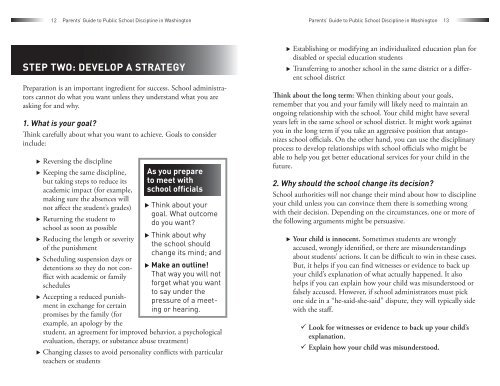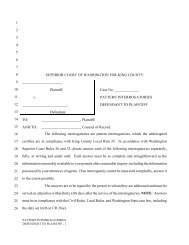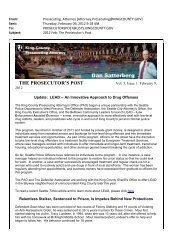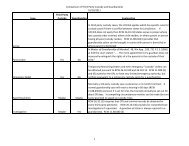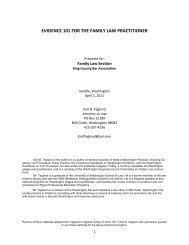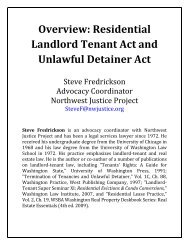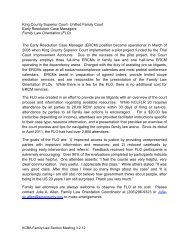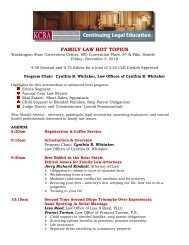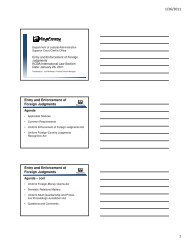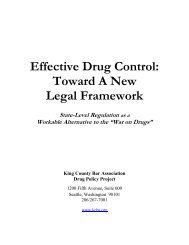parents' guide to public school discipline in washington - ACLU of ...
parents' guide to public school discipline in washington - ACLU of ...
parents' guide to public school discipline in washington - ACLU of ...
Create successful ePaper yourself
Turn your PDF publications into a flip-book with our unique Google optimized e-Paper software.
12 Parents’ Guide <strong>to</strong> Public School Discipl<strong>in</strong>e <strong>in</strong> Wash<strong>in</strong>g<strong>to</strong>n Parents’ Guide <strong>to</strong> Public School Discipl<strong>in</strong>e <strong>in</strong> Wash<strong>in</strong>g<strong>to</strong>n 13STEP TWO: DEVELOP A STRATEGYPreparation is an important <strong>in</strong>gredient for success. School adm<strong>in</strong>istra<strong>to</strong>rscannot do what you want unless they understand what you areask<strong>in</strong>g for and why.1. What is your goal?Th<strong>in</strong>k carefully about what you want <strong>to</strong> achieve. Goals <strong>to</strong> consider<strong>in</strong>clude:Revers<strong>in</strong>g the <strong>discipl<strong>in</strong>e</strong>Keep<strong>in</strong>g the same <strong>discipl<strong>in</strong>e</strong>,but tak<strong>in</strong>g steps <strong>to</strong> reduce itsacademic impact (for example,mak<strong>in</strong>g sure the absences willnot affect the student’s grades)Return<strong>in</strong>g the student <strong>to</strong><strong>school</strong> as soon as possibleReduc<strong>in</strong>g the length or severity<strong>of</strong> the punishmentSchedul<strong>in</strong>g suspension days ordetentions so they do not conflictwith academic or familyschedulesAccept<strong>in</strong>g a reduced punishment<strong>in</strong> exchange for certa<strong>in</strong>promises by the family (forexample, an apology by theAs you prepare<strong>to</strong> meet with<strong>school</strong> <strong>of</strong>ficialsstudent, an agreement for improved behavior, a psychologicalevaluation, therapy, or substance abuse treatment)Chang<strong>in</strong>g classes <strong>to</strong> avoid personality conflicts with particularteachers or studentsTh<strong>in</strong>k about yourgoal. What outcomedo you want?Th<strong>in</strong>k about whythe <strong>school</strong> shouldchange its m<strong>in</strong>d; andMake an outl<strong>in</strong>e!That way you will notforget what you want<strong>to</strong> say under thepressure <strong>of</strong> a meet<strong>in</strong>gor hear<strong>in</strong>g.Establish<strong>in</strong>g or modify<strong>in</strong>g an <strong>in</strong>dividualized education plan fordisabled or special education studentsTransferr<strong>in</strong>g <strong>to</strong> another <strong>school</strong> <strong>in</strong> the same district or a different<strong>school</strong> districtTh<strong>in</strong>k about the long term: When th<strong>in</strong>k<strong>in</strong>g about your goals,remember that you and your family will likely need <strong>to</strong> ma<strong>in</strong>ta<strong>in</strong> anongo<strong>in</strong>g relationship with the <strong>school</strong>. Your child might have severalyears left <strong>in</strong> the same <strong>school</strong> or <strong>school</strong> district. It might work aga<strong>in</strong>styou <strong>in</strong> the long term if you take an aggressive position that antagonizes<strong>school</strong> <strong>of</strong>ficials. On the other hand, you can use the discipl<strong>in</strong>aryprocess <strong>to</strong> develop relationships with <strong>school</strong> <strong>of</strong>ficials who might beable <strong>to</strong> help you get better educational services for your child <strong>in</strong> thefuture.2. Why should the <strong>school</strong> change its decision?School authorities will not change their m<strong>in</strong>d about how <strong>to</strong> <strong>discipl<strong>in</strong>e</strong>your child unless you can conv<strong>in</strong>ce them there is someth<strong>in</strong>g wrongwith their decision. Depend<strong>in</strong>g on the circumstances, one or more <strong>of</strong>the follow<strong>in</strong>g arguments might be persuasive.Your child is <strong>in</strong>nocent. Sometimes students are wronglyaccused, wrongly identified, or there are misunderstand<strong>in</strong>gsabout students’ actions. It can be difficult <strong>to</strong> w<strong>in</strong> <strong>in</strong> these cases.But, it helps if you can f<strong>in</strong>d witnesses or evidence <strong>to</strong> back upyour child’s explanation <strong>of</strong> what actually happened. It alsohelps if you can expla<strong>in</strong> how your child was misunders<strong>to</strong>od orfalsely accused. However, if <strong>school</strong> adm<strong>in</strong>istra<strong>to</strong>rs must pickone side <strong>in</strong> a “he-said-she-said” dispute, they will typically sidewith the staff. Look for witnesses or evidence <strong>to</strong> back up your child’sexplanation. Expla<strong>in</strong> how your child was misunders<strong>to</strong>od.


